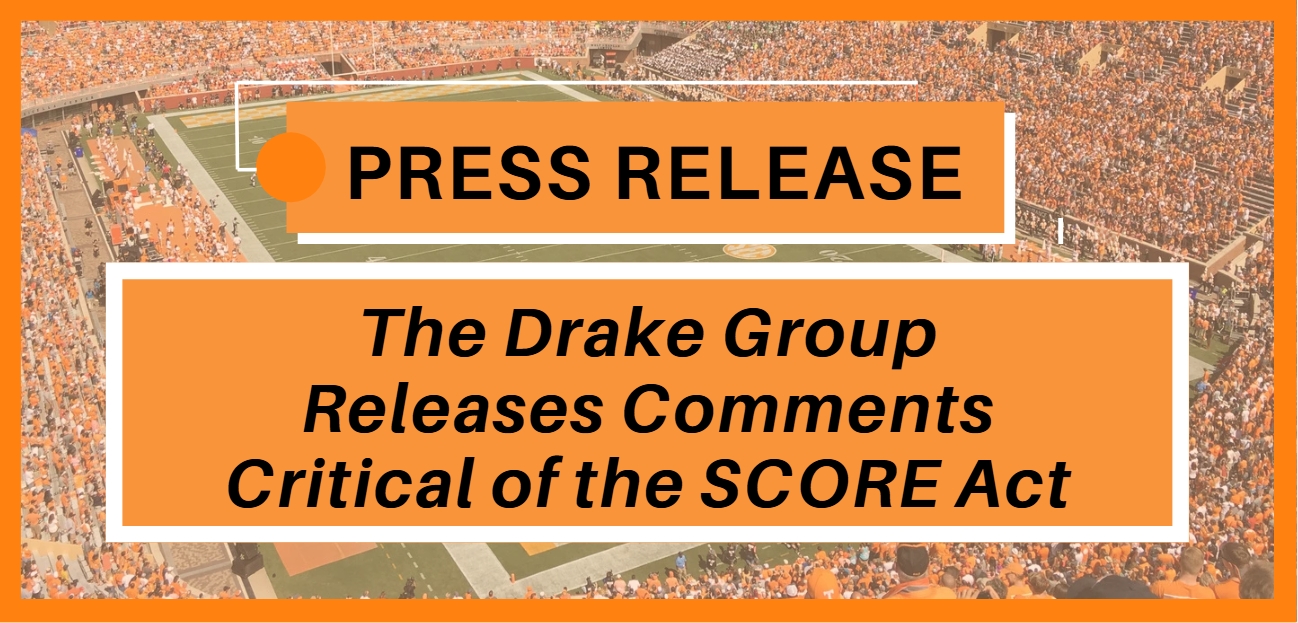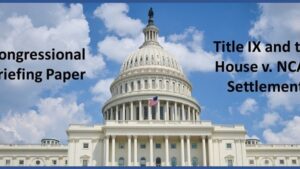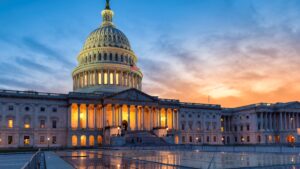The latest draft of the SCORE Act was released on July 10 in
preparation for this week’s markup in the U.S. House of Representatives Energy &
Commerce subcommittee. Since the bill would, in effect, formalize the recently approved
but contested NCAA v. House settlement as current law (seven appeals have been filed so
far) and create a massive pay-for-play and cash transaction culture in college sports, we
share our initial analysis and concerns.
For those who have not followed the NCAA v. House settlement, we provide the
following relevant background information and comment:
• The plaintiffs’ expert was explicitly told to disregard the application of Title IX in the
construction of the past damages pool, and, instead, developed a formula whereby
the settlement will deliver approximately 90% of $2.8 billion in past damages to
predominantly male football and basketball players.
• The settlement’s 10-year provisions do not specify that all types of financial benefits
given to college athletes must be shared equally between male and female athletes.
Moreover, the settlement does not detail the sport or gender breakdown of the new
funds to be allocated. Instead, both the settlement and the court’s opinion
approving it explicitly state that other courts should decide these issues—a clearly
inadequate remedy given that athletes will be required to pursue lawsuits.
• While participation in the settlement is specified as voluntary, as a practical matter,
each of the 65 P5 schools is expected to distribute to their college athletes close to
the specified limit of $20.5 million this year in new financial assistance above
previous scholarship limits. This amount is projected to grow to $33 million by year
ten under the provisions of the settlement.
• Most non-P5 NCAA Division I schools have also opted to participate in the new
settlement compensation construct. Due to more limited financial resources, they
are expected to spend significantly less. They will most likely not attempt to
compete with P5 schools on football expenditures but will try to remain competitive
in basketball to retain their current access to and success at March Madness, the
NCAA’s premier national championship.
• Most of the P5 schools have announced that they will allocate the future funds as
follows: 75 percent to football, 15 percent to men’s basketball, 5 percent to
women’s basketball, and 5 percent to selected priority men’s and women’s sports –
or similarly unbalanced amounts specified as past damages to male and female
athletes. Since 57 of the 65 defendant institutions appear not to be in compliance
with Title IX based on 2023-24 Equity in Athletics Disclosure Act data, and most
institutions have already awarded traditional athletics scholarships and signed
contracts with individual athletes for the new $20.5 million which may be $15.5
million if the institution qualifies for $5 million in mandatory reductions), it is
unlikely that for either amount they will or even will have the resources to provide
gender equity to their female athletes to be in compliance with Title IX. Indeed,
many conferences and institutions have been explicit that the new payments are
not covered by Title IX.
It is within the above-described context that the SCORE Act should be evaluated.
Thus, while the Score Act provides some clarity in particular areas, The Drake Group
is most concerned that it fails to provide any clarity regarding the application of the new
financial distributions to athletes with a Title IX lens. Instead, its silence on this issue will
be used to support the above gender inequitable distribution of new financial benefits. The
Drake Group believes that Title IX compliance must be a condition of receiving the antitrust
exemption provided by the SCORE Act. We also share the following additional SCORE Act
concerns:
• The Act does not require institution, conference, or NCAA NIL payments to enrolled
or recruited athletes to conform to the same following legitimate NIL standards as
the Act applies to “associated third party entities” such as booster NIL collectives:
1) For a valid business purpose related to the promotion or endorsement of goods
or services, and not to pay for participation in athletics.
2) Compensation at rates and terms commensurate with compensation paid to
individuals with NIL rights of comparable value who are not college athletes or
prospects
3) Submission of agreements to NIL Go (NCAA NIL clearinghouse) in the same
manner as NIL agreements with associated entities for verification of (1) and (2)
above.
If payments to athletes are not for legitimate NIL or other non-sports performance
employment, they are either cash inducements to attend or pay-for-play which are
not permitted under NCAA rules.
• The Act declares college athletes to be non-employees while allowing their
institutions to control them as employees (e.g., control of and excessive demands
on their time, ability to terminate their compensation arrangements at will, right to
terminate eligibility for participation at will, etc.). While the Act will permit schools
to pay highly skilled athletes with additional compensation labeled NIL licensing or
other cash payments, it does not provide them with potential employee benefits
(e.g., collective bargaining, overtime pay, social security and Medicare
contributions, workers’ compensation, etc.)
• The Act fails to address the currently evident burdensome and unfair institutional
contracts with athletes, as well as the lack of athlete protections such as due
process or arbitration options if they lose their eligibility to compete.
• While the Act rightfully protects the athlete’s right to privacy concerning outside
third-party NIL agreements, it does not require public education institutions to fulfill
their transparency requirements regarding public access to institutional contracts
and compensation agreements. The institution’s new NIL licensing agreements,
revenue sharing, or other athlete compensation arrangements are not tethered to
educational expenses and therefore should be accessible through open records
requests. Athletes’ names or identifying information may be redacted if documents
contain educational or medical information protected by privacy laws.
Given the above SCORE Act flaws, absent amendments to remove these
deficiencies, The Drake Group believes college athletes will be ill-served by such legislation
and urges Congress to reject the bill.
_________________
Concerned that neither the public nor members of Congress fully understand how
Title IX works with regard to separate sex athletics programs, The Drake Group will soon
release a “white paper” explaining how institutions now and in the future under the new
settlement provisions are permitted to prioritize financial benefits for men’s football and
basketball (or any selected sports) while still meeting Title IX’s standard of equitable
participation, financial assistance, and benefits and treatment for female athletes.









